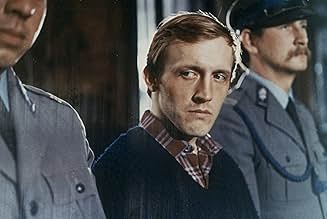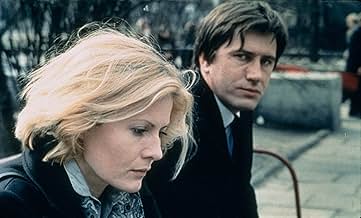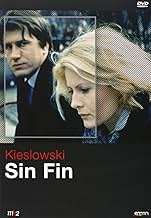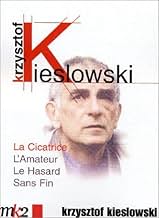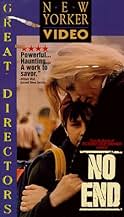NOTE IMDb
7,3/10
6,1 k
MA NOTE
L'épouse de l'avocat récemment décédé essaie de faire face au deuil après sa perte et de poursuivre sa dernière affaire devant les tribunaux.L'épouse de l'avocat récemment décédé essaie de faire face au deuil après sa perte et de poursuivre sa dernière affaire devant les tribunaux.L'épouse de l'avocat récemment décédé essaie de faire face au deuil après sa perte et de poursuivre sa dernière affaire devant les tribunaux.
- Réalisation
- Scénario
- Casting principal
Danny Webb
- American
- (as Daniel Webb)
Jacek Domanski
- Dzialacz opozycji
- (non crédité)
Avis à la une
The narrative in this film is far too flawed. There are two intertwining halves of it, one good, one poor. The good one involves a woman, Ulla, whose husband died suddenly and unexpectedly one morning while he waited in his car to take their son to school. Now he gently haunts his family as they deal with the pain. The acting is magnificent here. Kieslowski is masterful at directing his actors in material like this, as he would show a million different times in The Decalogue, made a few years later. There are a few outrageously and subtly powerful scenes. Most memorable is the one where Ulla decides to prostitute herself to a British tourist. This happens about a month after her husband has died. After the man has sex with her, she asks him if he speaks Polish. He says no, and then she begins to talk about her problems in Polish. The other half of the plot is utterly weak in comparison. The husband was a lawyer, and the defendant in the case he was working on is screwed because of the death. The defendant's wife comes to Ulla for help, and though she is refused help at first, Ulla eventually introduces her to her husband's mentor, a cynical old man about to be kicked out of the business. Perhaps it's just my aversion to lawyer and courtroom dramas, but I just didn't care a lick what happened in this part of the plot. Supposedly it's meant as a criticism against the Communist law at the time. I don't know. It's dull whatever it is. But the film is slightly worth watching, especially for the acting. Even in the parts that I didn't care for, the acting is exquisite. 7/10.
I state for the record that I did not understand this film fully. The second plot with Solidarnost protester imprisoned and released by the court is not completely clear to me. Yet it has little to do with politics and more with human condition (ideals, expectation, compromise). Prisoner's family doesn't react happily upon his immediate release in a court room. There is awkwardness and embarrassment in that scene, as if some unforgivable compromise has been made and it tainted all of their relationship. Accident scene with a death of motorist seems random but reoccurring theme in Kieslowskij movies. Randomness of death, randomness of existence. Movie is wonderfully shot , music (as always) is haunting. I just cannot put it all together in my mind like I could with Veronique.
...and not much of a middle, either. Beginning's pretty good, though. Is it just me or is TCM Imports, under Alicia Malone, grimly determined to show every single heavy, stolid, dull, depressing film from Mr. Kieslowski? Just one solid, grey, bleak, enervating shroud until I finally cried "wystarczajaco" right around the time Antec's lovely, grieving widow, for reasons best known to Kieslowski and herself, decides to sleep with a random English dude she picks up in a bar. If I were a cynical sort I'd say that the dour Pole had a commercial side to his foreboding personality as I'm sure the sight of Grazyna Szapolowska's luscious bod did not exactly discourage ticket sales. God knows, you need something to quicken the ol pulse as you watch this bloodless bunch, cigarettes stuck firmly in their mugs, stare into the abyss, weep, occasionally crack a bitter joke and stare some more. For awhile, I was hoping that there would be some courtroom drama since the plot seemed to involve a lawyer trying to free a political prisoner. But at the film's halfway mark nary a judge, jury or executioner were to be found. Unless, of course, you see Kieslowski as the hangman of all that is dramatically compelling. C plus.
This is an excellent film and a great discovery. It's from about ten years before The Double Life Of Veronica and the Three Colours trilogy and is, it its way, equally good. It almost certainly inspired Truly, Madly, Deeply because the main story is about a young lawyer, Antek Zyro (Jerzy Radziwilowicz) who tells us at the outset that he is dead and spends the remainder of the film watching over his widow and young son. Grazyna Szpapolowska is outstanding, not to say beautiful, as the widow who 'feels' her husband everywhere and tries a variety of remedies - hypnosis, casual sex - to dispel his presence all to no avail. It's a stunning film shot in muted blue tones throughout and well worth a visit. 9/10
Although there is the obvious plot of the grieving wife, the movie is really about Poland under martial law. Probably unable to directly focus on such political topics, Kieslowski attempts to 'hide' this other side beneath a twisted Ghost subplot.
A dark movie, one that demands attentive viewing, this one will probably never be as successful as some of Kieslowski's other works, which have probably led its viewers to pick up this one.
A dark movie, one that demands attentive viewing, this one will probably never be as successful as some of Kieslowski's other works, which have probably led its viewers to pick up this one.
Le saviez-vous
- AnecdotesThe film takes place in 1982.
- Citations
[First lines]
Antek Zyro: [speaking directly to the camera] I died - four days ago.
Meilleurs choix
Connectez-vous pour évaluer et suivre la liste de favoris afin de recevoir des recommandations personnalisées
- How long is No End?Alimenté par Alexa
Détails
Contribuer à cette page
Suggérer une modification ou ajouter du contenu manquant


